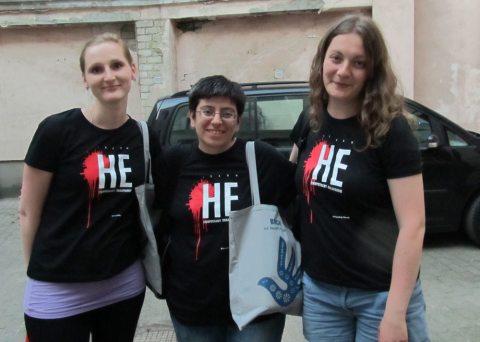Berlin students: Young Belarusians have to fight for their rights and not to lose hope (photos)
Three students of the Free University of Berlin, one of Germany’s largest universities, came to Vilnius to meet with the participants of the Summer Human Rights School, as well as with students from the Vilnius-based European Humanities University. Elena Gettsel, Satik Agekyan and Elena Pulich chose Belarus as the subject of their research at the Institute for East European Studies, which, according to them, is a rare option. Meanwhile, this choice was suggested by a circumstance that impressed them so much – until today the Belarusian state punishes its people with death, disregarding the right to life. During their meeting with the Belarusian youth, the issue of the death penalty was in the center of the discussion of the problems of human rights in Belarus.
In their interview with the Human Rights Center “Viasna”, the ladies told about the nature of their research and shared their impressions of meeting young Belarusians.
- Could you please tell us how Belarus has become the focus of your attention?
Elena Gettsel: As part of our studies at the Institute of East European Studies at the Free University of Berlin, we have a project course, the main subject of which is civil disobedience. And we chose Belarus to analyze what manifestations of disobedience are possible in this country. Because everyone knows, and our media often tell about it, that Belarus - this is the last dictatorship in Europe, but this information is not so wide, we know nothing about the country. Therefore, we were interested in exploring the subject of Belarus.
Satik Agekyan: I have been in Germany for six years already, and I've always been interested in helping people when I can do something to help, to do something for them. And that's my main goal. And this project on human rights in Belarus and the death penalty caused my interest.
- What did you know about the situation in Belarus before your meeting with the Belarusian youth?
Elena Pulich: Before we started doing it, I just knew about the Lukashenka regime, that it restricts human rights... Three years ago, at our university there were flyers by Amnesty International, in which I read that in Belarus still used the death penalty, and this all was very strange for me, I was very surprised that the death penalty still exists in Europe.
Elena Gettsel: Before coming to this school I had known students from Belarus. And when I met them I heard for the first time that in your country there are such absurd things, such as that you cannot clap on the streets, that the streets are very clean and there are no homeless people - the "perfect" order, which is alarming. And I was also told that when students were involved in politics, then they were visited by people from the KGB and interviewed... And, as Lena already said, about the Lukashenka regime, that in 2010 there were huge problems...
- Each of you mentioned the problem of the death penalty in Belarus. What is the attitude to this issue among the German youth?
Elena Gettsel: Generally, in Germany the death penalty is perceived negatively. At least in our environment, the students who receive a higher education, they are against the death penalty, and it is clear why it is necessary to be against: because there may be legal errors and because the death penalty will not help anyone. Of course, there are people who are in favor of the death penalty, but everyone understands that people say so in a rash, it's an emotional reaction.
- Due to what, in your opinion, has such an attitude to the death penalty been formed?
Elena Gettsel: I think we very openly talk about it in schools, in universities, in the media. No one is afraid to speak out on this topic.
Satik Agekyan: I think this attitude begins with the general political situation. Germany is a democracy, and when people see the police on the street when, they are not afraid, they know they are protected, and not, for example, like in Belarus...
Elena Gettsel: And there's access to information. If anyone is interested in the topic of the death penalty and people want to get more information, they can easily find it. Most importantly, this information is available and accessible to all. And I think that if a person is educated and informed, it's a very big advantage.
- Before your trip you probably searched for information about the death penalty in Belarus. Were there any unexpected moments for you in comparison to other countries, for example?
Elena Gettsel: We all know that in Europe there is no death penalty, except for Belarus, and in the USA it is. But in Belarus, it is more severe because people who are sentenced to death do not know when they will be executed. And the family is also not notified when the person was executed, where their son or brother was buried... It's very scary.
Satik Agekyan: It's horrible to parents...
Elena Pulich: And yet another moment: the state can use the death penalty to crack down on the opposition to keep society intimidated.
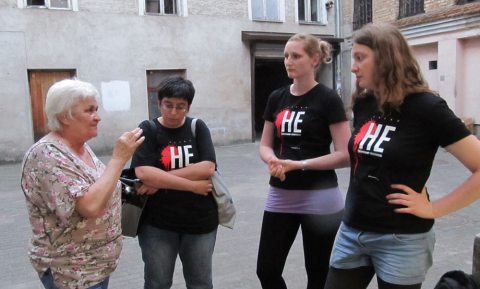 The young researchers met with an expert on the death penalty, Tamara Chikunova, who took part in this year’s Human Rights School
The young researchers met with an expert on the death penalty, Tamara Chikunova, who took part in this year’s Human Rights School
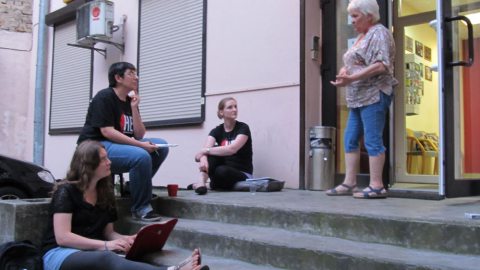
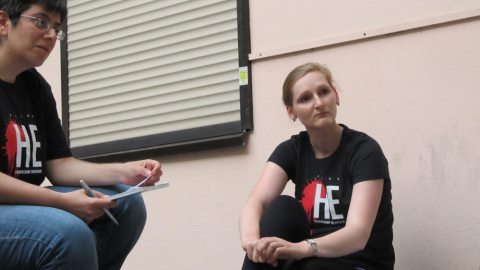
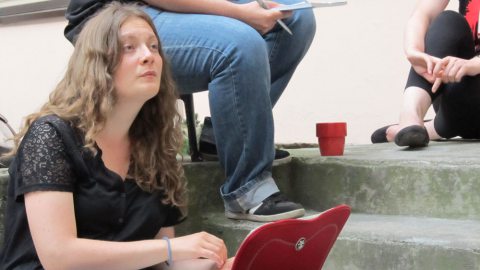
- The problem of the death penalty is one of the central problems in your study. What is its main purpose?
Elena Gettsel: We want to write an article and publish it online, because, on the one hand, we often talk about the death penalty in Belarus, but on the other hand, there is very little information about the country itself. And it's interesting. Because at the Institute of East European Studies, we are engaged in these issues and we understand what it is and where it is - Belarus. But there are people who do not even know where this country is, and even do not know what is going on in this country. We want to inform people by the results of our work, by our article, to show what we have learned about Belarus.
Elena Pulich: To tell what the Belarusian youth thinks about the death penalty, human rights in general, to show that there are alternative views on this matter...
Satik Agekyan: And, finally, to understand whether there is hope that the situation in Belarus will change for the better. We now had a talk with the Belarusian youth, and it seems to me that there is such a hope.
- Yes, you had the opportunity within a few days to talk with Belarusian students. Whatyou’re your impressions?
Elena Gettsel: It is understood that the students of the human rights school are more active, they are interested in human rights themes and they are here because they want to learn even more about human rights. But we also sent questionnaires to other students who are studying in the Humanities University in Vilnius, and in these questionnaires, they often wrote that human rights are not the most important thing, that the death penalty is not the main problem in Belarus, there are other difficulties in the country, “it does not concern me”, “it's not my personal problem”. That is, these students were more passive, they showed that for them human rights problems are not important. I think that this would not have happened in Germany, it is exactly clear to us – what human rights are and why the state must comply with them, why there should be no death penalty in the country.
- Why, in your opinion, the situation in Belarus is like this, the way you have now defined it?
Elena Gettsel: Firstly, because the media is controlled. And I think this is the main problem.
Satik Agekyan: Yes, people in Belarus know nearly nothing about human rights because of lack of information. I can compare the situation with other countries of the former Soviet Union. For example, in Armenia the situation is the same - people have little understanding of what happens in politics, they do not have the information necessary to fight for their interests. And I think that the Human Rights School is very important for the Belarusian youth. When communicating with the participants for a few days, I see that people are starting to compare, to analyze what is happening in their own country - what they knew and understood so far, and taking into account the knowledge that they got in the classroom.
Elena Gettsel: Speaking of why the Belarusian young people are more passive than the German ones, I would add that your authorities have made some efforts for this. After all, if a person grows in an environment where there is little freedom of information, he gradually gets used and perceives this situation as normal, calms down - like, I do not know more, but I do not need it.
Elena Pulich: Speaking of the young people we met at the School, I must say that I was pleased to see how they were interested to learn more, and to hear different motivation... For me, it was cool to know that there are young people in Belarus, who are interested in human rights, who understand what human rights are violated and that this is wrong. So for me it was interesting to communicate with them.
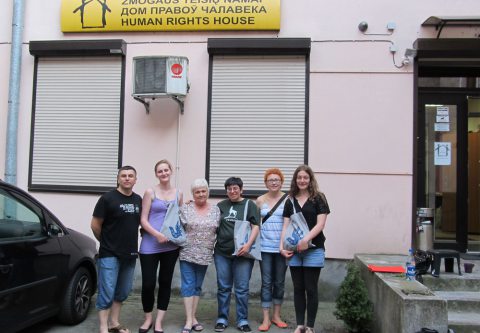 With coordinator of the campaign “Human Rights Defenders against the Death Penalty in Belarus” Andrei Paluda, Tamara Chikunova and Iryna Smeyan-Semianiuk
With coordinator of the campaign “Human Rights Defenders against the Death Penalty in Belarus” Andrei Paluda, Tamara Chikunova and Iryna Smeyan-Semianiuk
- What advice would you give to Belarusian students in order to strengthen the hope for a better future of their country?
Satik Agekyan: You have to fight for democracy, as it is in Germany. A very good example: if we have something wrong at our university, all the students stand up and declare that they want changes. And although their demands are not met in the current year, but next year it happens, they achieve what they want. I think, in Belarus it is also possible, if the youth is not indifferent to their rights, if they defend them. It will be difficult. Very difficult. But they have to fight for what they want.
Elena Pulich: And not to lose hope. I think it's very difficult because, as people from Belarus said there we have fear, we fear the regime... But they should not forget that in the country there are organizations such as “Viasna”, which work to change something. And that is why you should never give up your ideas, your ideals - you have to believe.
Elena Gettsel: It seems to me that a very clear example are the events in Kiev. Indeed, Belarusians and Ukrainians are Slavs of post-Soviet countries, they have a common history... But why such a big difference in mentality? Why do Ukrainians fear nothing and go to Independence Square to protect their rights? And why are Belarusians so calm, quiet and hold it in themselves? Maybe you should follow the example of your neighbors who are so active...
